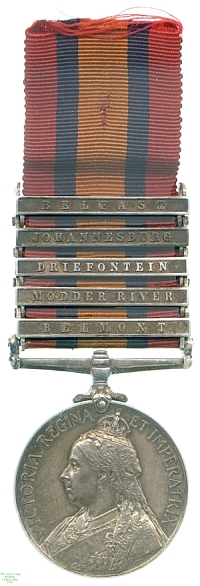
Obverse, a bust of Queen Victoria with veil

Reverse, Britannia in the foreground facing right holding a standard and waving a wreath over an army marching along the shore, with ships offshore in the background

Obverse, a bust of Queen Victoria with veil |

Reverse, Britannia in the foreground facing right holding a standard and waving a wreath over an army marching along the shore, with ships offshore in the background |
During the 1830s and 1840s several Dutch republics had been established outside the British Cape Colony in South Africa, among which were Transvaal and the Orange Free State, all now in modern South Africa. Transvaal was annexed briefly by the British but its independence re-established in the First Boer War.
In the 1880s however the discovery of vast gold reserves in Transvaal brought large numbers of foreign settlers, largely British, across the border, and an attempted coup at the instigation of Cecil Rhodes in 1895. Military escalation followed, negotiations failed and the two Boer republics, convinced that the British intended annexation, declared war in the Cape Colony in October 1899.
The immediate result was the siege of British troops in Ladysmith, Mafeking and Kimberley, while field forces attempting to come to their relief were defeated in several open battles by Boer contingents. Kimberley, the first town to be relieved, could open its gates only in mid-February; Mafeking, famously, had to hold out until May.
Imperial forces sent to relieve Kimberley reached Belmont on 23 November 1899 and found that the Boers had set up defensive positions across their path. Heavy Imperial superiority in numbers meant that a full frontal advance was effective despite the casualties this tactic invited, and the Boers fell back to Graspan, which the Imperial troops also forced them out of. The Boers fell back to the Modder River and there massed a resistance in force. Here, although outnumbering the British and defending their positions against all infantry assault, the Boers were unable to withstand the heavy Imperial artillery fire and again had to withdraw, albeit with casualties far slighter than the Imperial ones (75 to their 450). The Imperial advance continued in this unbalanced way, including a bitter close engagement at Driefontein on 10 March 1900, whose site has only recently been reinvestigated.
Ladysmith was finally relieved on 15 February, by which time a fuller Imperial offensive was driving the Boers back. Their resistance in the field was more or less quelled by May 1900, at the end of the which month the mining town of Johannesburg fell to Imperial attack, but a final set-piece battle was fought at Bergendal (also known as the Battle of Belfast, after the larger town nearby) in which the Boer forces under Louis Botha, outnumbered four to one, were unable to hold off the Imperial troops and finally withdrew from organised fighting. They maintained a bitter and obdurate guerilla campaign in several areas of the two Republics until mid-1902, when a surrender was finally agreed.
This medal was awarded to Private A. McDowell of the Coldstream Guards. The Guards were heavily involved in the Boer War at all stages of the fighting, and McDowell's battle honours, all along the slow advance to Ladysmith and then beyond in a succession of difficult engagements, reflect this clearly. The earliest issues of the medal indicate that the War was not expected to last as long as it did, as they bear the dates 1899-1900 in the reverse field. Very few were issued in this state, but a large number of the first issues show signs of the dates' erasure, often as in this case insufficiently thorough. Lester Watson purchased the medal at some point before 1928.